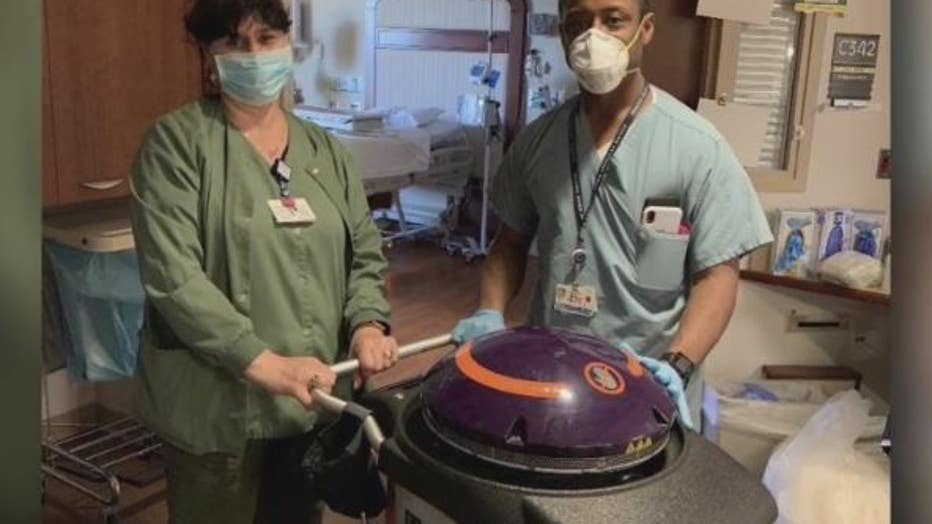COVID-19 showcased frontline medical workers' strength and bravery
FOX 2 - Beaumont Nurse Kelsey Ryan is overjoyed to be reunited with her former patient Jessie Gonzalez, who almost lost his battle with COVID-19 last fall.

COVID-19 one year later: How the pandemic battle was fought on the medical frontline
Frontline workers pushed on for months, doing what needed to be done to care for patients. Over time, hospitals became better equipped and protocols were created to effectively treat patients.
"It was a very daunting experience because I had no idea what was going to happen," Gonzalez said. "I had never been through that, I thought my life was going to end."
Ryan is one of the thousands of selfless frontline workers who put their lives on the line to care for patients - while we were all still learning about the novel virus.
"I feel like I am now just processing everything from last year," Ryan said.
Last March, as the number of COVID-19 cases began to skyrocket, it was all hands on deck at Michigan hospitals. Non-emergency procedures were put on hold.
Instead of stepping back, Dr. Lamont Jones, who specializes in ear, nose, and throat and facial plastic surgery - stepped up.
"Fueling the culture that exists at Henry Ford, people wanted to help, people pitching in, no job is too small," Dr.Jones said.

Dr. Lamont Jones, right, at Henry Ford led the charge in volunteering to help clean and disinfect with this robot after pitching in.
That became clear when Jones volunteered to help the Environmental Services Team at Henry Ford Health System disinfect patient rooms. He quickly learned how to operate a robot that uses UV light to destroy germs and bacteria.
"It wasn't necessarily that there was less cleaning people available, it was that the need to do it increased," he said.
To allow more patients to be treated, Jones volunteered on nights and weekends for months. He convinced other clinical colleagues to join the effort. In appreciation, they named the cleaning machine after him, "The Lamont."
"I sort of started the spark but in our department, we covered about 100 shifts in environmental services and this included nursing and medical assistants," he said.
Frontline workers pushed on for months, doing what needed to be done to care for patients. Over time, hospitals became better equipped and protocols were created to effectively treat patients.
Patients like Jessie Gonzalez.
"Nothing that will happen to me will ever be as bad as what happened," Gonzalez said. "So I feel I can take things in stride and I am just very positive in the future."

Beaumont nurse Kelsey Ryan.
But Gonzalez needed more than medicine. He was in strict isolation on Beaumont's Covid floor and the musician from Shelby Township couldn't see his family - but he desperately wanted his guitar.
His nurse, Kelsey Ryan, made it happen.
"You saw that guitar in his hand and he just perked right up," she said. "The anxiety that he was having prior, we couldn't do anything for that nervousness. All of our patients experienced that, that fear of not being able to catch your breath and the anxiety that it brings. The guitar took that away for him at the time, I think. The guitar made him feel at home, the guitar made me feel closer to his family and all those memories. I really believe it is what got him through."
"I am just so grateful," Gonzalez said. "I got to sing and play for all of them. Kelsey and I did a song together."
Gonzalez sang with Kelsey and continued to play his guitar every day, which lit up the Covid floor that at times experienced so much darkness.
"I needed Jessie at that time in my career more than he needed me, I truly believe that," she said.
After spending 20 days in the hospital, Gonzalez was able to fully recover, return home to his family, and continue to make music. His daughter wrote a song for him when he was sick.
Through the devastation, came appreciation and bonds that will last a lifetime.

Nurse Kelsey Ryan performs a song with COVID-19 patient Jessie Gonzalez.
"You guys touched me more than I could ever do," he said. "I am very grateful."
"We are just as grateful for you, Jessie," Ryan said. "I'll never ever forget you."
Kelsey Ryan still works on the Covid floor at Beaumont Royal Oak and Jessie plans to go traveling with his Spanish Christian rock band in August if the current pandemic numbers continue to trend down.

